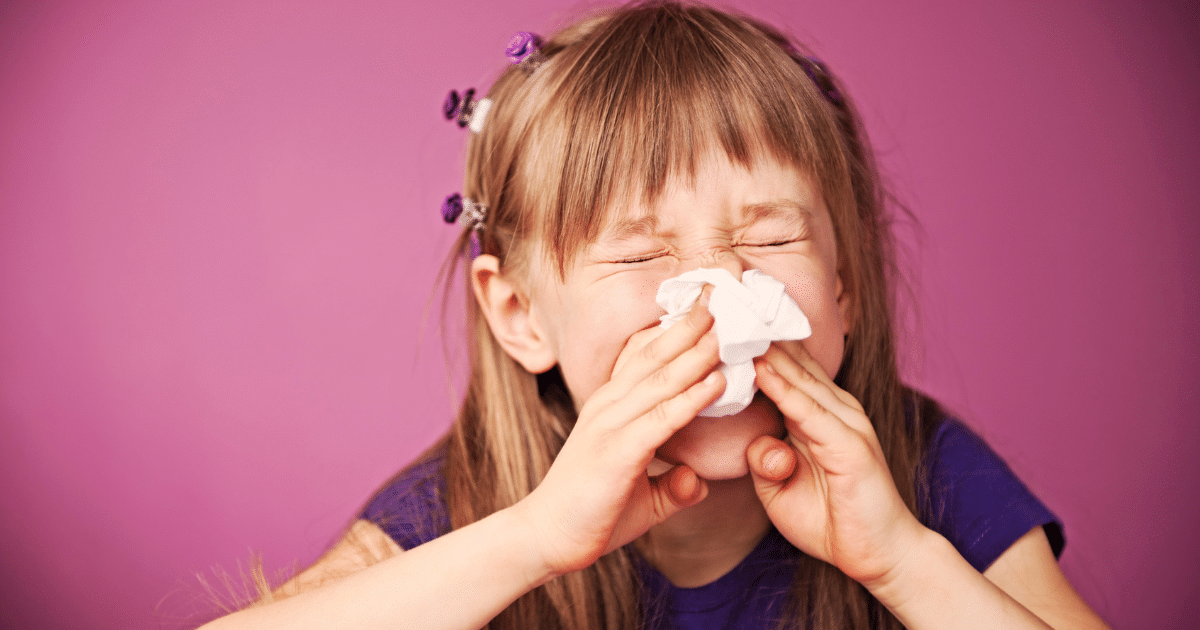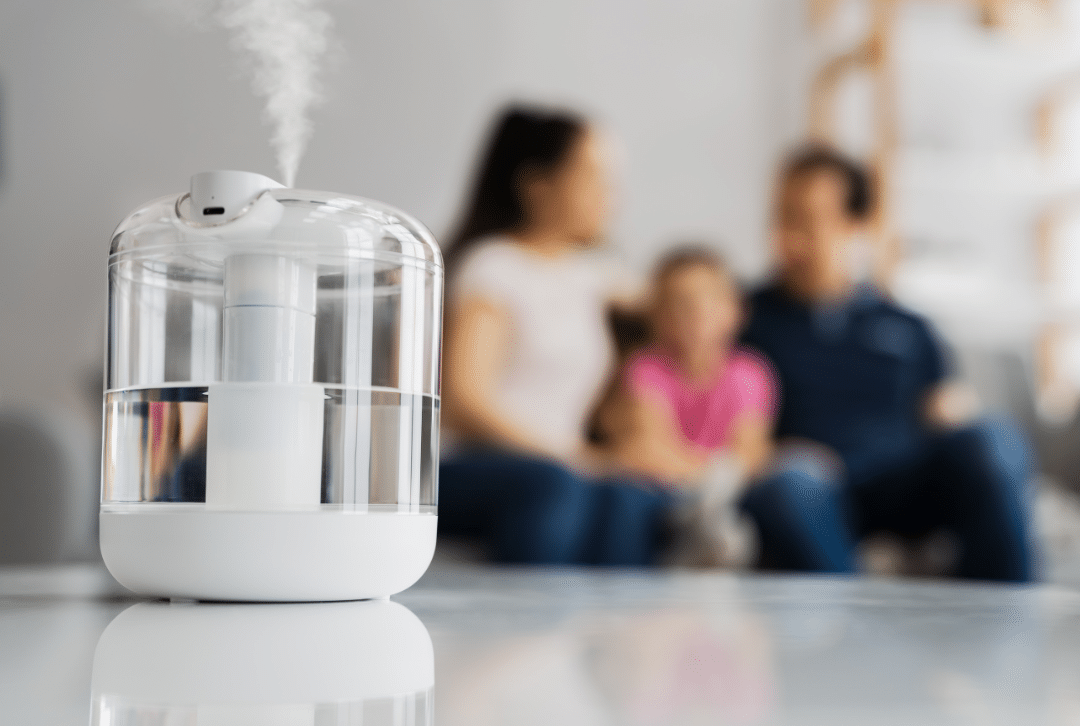Seasonal allergies, often referred to as hay fever, are a common and yet uncomfortable problem, affecting millions of children every year. During allergy season, children may experience symptoms such as runny nose, itchy eyes, sneezing, and even asthma attacks. While symptoms can be annoying, they are mostly harmless and not life-threatening.
It can be difficult for parents to know how to help their child deal with seasonal allergy symptoms, and even more challenging to figure out what causes them. In this blog, we will explore the causes of seasonal allergies in children, and offer practical tips and solutions for managing them. Whether you are a parent, guardian, or caregiver, we will provide you with the information and resources you need to help your child feel better during allergy season.

Seasonal Allergy Symptoms
During pollen season, the air is full of outdoor allergens, including pollen from trees, grasses, and weeds. These allergens can enter the body through the nose, skin, and eyes causing an allergic reason. Recognizing the signs of seasonal allergies can help parents determine what is causing the reaction, take steps to treat it, and avoid it in the future. The most common symptoms of seasonal allergies are:
- Congestion and nasal stuffiness
- Coughing
- Fatigue
- Headache
- Itchy throat, nose, and eyes
- Runny nose and sneezing
- Sinus pressure around the nose and cheeks
- Sore throat aggravated by mucus
- Ear pain when swallowing due to sore throat
How to Treat Seasonal Allergies

Reducing Pollen Inside
To keep pollen outside, where it belongs, you'll want to ensure your windows and doors stay closed during high pollen count days. As tempting as it might be to open your windows and let the nice spring air in, open windows are the easiest way for pollen to enter your home. During pollen season, it's best to utilize air conditioning to keep your home cool instead of opting for open windows.
These suggestions apply to your car too. As you drive around, especially with your child, keep car windows closed and utilize the air conditioning to reduce the amount of pollen entering the vehicle.

Cleaning Tips
It's important to wash your child's bedding weekly, as allergens can accumulate in bedding over time. You should also avoid hanging laundry outside, as this can increase exposure to allergens in the air. Regularly vacuum and clean floors with a damp mop to help reduce allergens in your home. Opt for a damp mop as opposed to dry sweeping as that can kick up allergens. Replace air filters regularly as this can help to remove allergens from the air and improve indoor air quality. Many air filters have versions that are specifically designed for filtering out pollen and are ideal for a household with a child suffering from seasonal allergies.
Other Ways To Reduce Allergy Symptoms
During pollen season, it is recommended to limit outdoor activities to minimize exposure to allergens. This can be especially important for children who are particularly sensitive to seasonal allergies. To keep kids active and engaged, consider alternative indoor activities such as swimming or playing at an indoor jungle gym. These activities can provide a fun and safe way for children to stay active while avoiding exposure to pollen and other allergens in the air.

If your child must play outside, it's suggested that they wear glasses or sunglasses to minimize the amount of pollen getting into their eyes. After they are done playing outside be sure to have them change their clothes as soon as they are done to minimize exposure to pollen and other allergens. If you notice your child is suffering from watery or itchy eyes, encourage them to avoid rubbing their eyes as that can spread the pollen and make the symptoms worse.

Use A Humidifier
Using a humidifier or steam from a hot shower can help treat allergy symptoms by adding moisture to the air and loosening mucus in the nasal passages. Dry air can exacerbate allergy symptoms, causing the nasal passages to become dry and irritated. Adding moisture to the air can help soothe symptoms and reduce discomfort. Additionally, the steam from a hot shower can help to clear the nasal passages and reduce congestion, providing temporary relief from allergy symptoms. However, it is important to keep the humidifier clean to prevent the growth of mold and bacteria, which can worsen allergy symptoms.

Seasonal Allergy Medicine
When it comes to managing seasonal allergies in children, there are a variety of medicines that can be effective in relieving symptoms. Some common options include over-the-counter antihistamines, decongestants, and nasal corticosteroids. These medications can help to relieve symptoms such as sneezing, itching, runny nose, and congestion. It's important to talk to your pediatrician before starting any medication, as they can help determine the best course of treatment based on your child's specific needs and health history. Your pediatrician may also recommend other treatments to help manage your child's seasonal allergies.
Hampton Roads Pollen Season
Depending on the type of pollen your child is allergic to, allergy symptoms can start as early as January and end as late as November. Pollen counts for trees are highest from March-May, grass from May-July, and weeds from July-October.
Tree, grass, and weed pollens are different and your child is likely not allergic to all of them. If you can identify which of these pollens are causing your child’s allergies, you can better determine what time of year you’ll need to focus on managing their exposure to these triggers.
It's important to regularly check pollen counts to stay proactive and manage exposure.
Tree Pollen |
Grass Pollen |
Weed Pollen |
|
|---|---|---|---|
| JANUARY | |||
| FEBRUARY | |||
| MARCH | |||
| APRIL | |||
| MAY | |||
| JUNE | |||
| JULY | |||
| AUGUST | |||
| SEPTEMBER | |||
| OCTOBER | |||
| NOVEMBER | |||
| DECEMBER |

Ragweed Pollen
One of the most notorious pollens is Ragweed. This pollen is light and easily spreads through the air, causing allergic symptoms. Ragweed season begins in early August and peaks in mid-September and October before declining in November.
Frequently Asked Questions
Seasonal allergies can start at almost any age, though they usually do not develop before a child is 2 years old. Most people with seasonal allergies develop them by age 20.
A common cold is typically accompanied by a fever and body aches, while allergies are not. The common cold lasts between 5 and 10 days. Allergies can last longer depending on your exposure to allergens.
In the Mid-Atlantic, seasonal allergy suffers typically start experiencing symptoms in March due to our early Spring weather.
Seasonal allergies are seasonal and can come and go as the pollen season changes. Depending on the type of pollen that affects your child, they could experience allergies as early as March and as late as October.
Summary
Hampton Roads pollen season has kicked off and is sure to bring about allergy symptoms in your child. While, seasonal allergies can be a difficult condition to manage in children, with the right treatment and lifestyle changes, it is possible to reduce the symptoms and improve the quality of life for children with seasonal allergies. Recognizing the signs of seasonal allergies and taking steps to avoid allergens can help to prevent the onset of symptoms and reduce the severity of allergic reactions in children.
If you're unsure if your child is suffering from seasonal allergies or another condition, it's important to consult with a pediatrician. They can help diagnose the issue and provide the appropriate care and treatment.
If you're looking for a new pediatrician in the Virginia Beach area, consider choosing Pediatric Affiliates of Hampton Roads. Our experienced pediatricians are dedicated to providing high-quality care and support to children of all ages. With our personalized approach and commitment to patient care, you can feel confident that your child is in good hands. So why wait? If your child needs a pediatrician, make an appointment with Pediatric Affiliates of Hampton Roads today and give your child the care and support they need to thrive.
